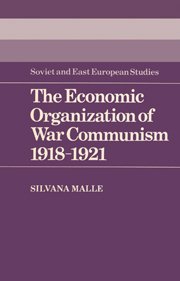Book contents
2 - Nationalization of industry
Published online by Cambridge University Press: 16 October 2009
Summary
THE APPROACH TO NATIONALIZATION AND STATE CONTROL
Marxist literature has generally focused on the expropriation of the means of production as a decisive step towards socialism. The aim of abolishing private property, however, did not in itself provide positive indications regarding the operation of the new institutions. Nor did Marxist literature ever systematically examine the possible alternatives. This neglect may be ascribed to the composite nature of Marxism: on the one side, its attachment to an empirical approach to economic problems; on the other, a deep-rooted faith in the creative imagination of the proletariat. The first aspect was responsible for a sort of self-censorship in the face of alternatives of a speculative nature. The second aspect, rooted in the tradition of humanitarian socialism, provided an incentive to postpone the solution of concrete problems to a point at which the liberated proletariat would display its full potential in organizing a more just society. The basic tenet of the Marxian analysis – the necessary transition from one mode of production to a higher one, once the former had achieved its full development – provided the theoretical framework for faith in an inevitably more progressive society together with an uncritical acceptance of the neutrality of technology.
Of the few hints given by Marx on the possible form of the new mode of production, some can be derived a contrario from the criticism of capitalism and others from the prescriptions of communist programmes.
- Type
- Chapter
- Information
- The Economic Organization of War Communism 1918–1921 , pp. 29 - 88Publisher: Cambridge University PressPrint publication year: 1985

